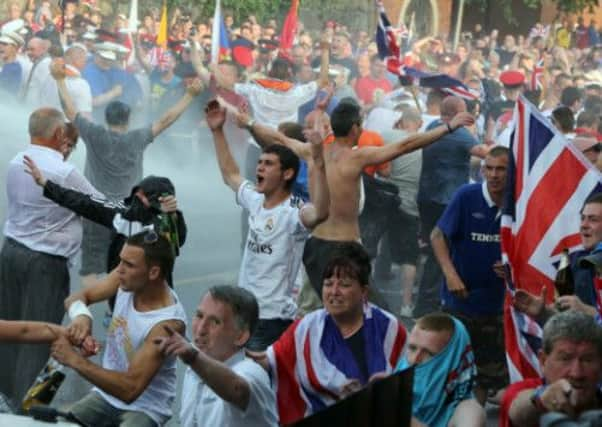Orange Order parade: 300 more officers sent


• 300 additional police officers dispatched to Northern Ireland from Great Britain to strengthen PSNI resources
• Deployment comes as fears grow over public disorder surrounding a controversial Orange Order parade
Advertisement
Hide AdAdvertisement
Hide AdThe deployment brings to 1,300 the number of mainland UK officers that have been called to the region within the last week to support the under-pressure Police Service of Northern Ireland (PSNI).
Loyalist rioting erupted in Belfast for a fifth successive night last night.
The extra officers are travelling to the region as a US diplomat charged with finding a resolution to the thorny parading issue jetted into Belfast for a first round of meetings with Stormont’s political leaders.
Dr Richard Haas, a former White House special envoy to Northern Ireland, is due to chair cross party negotiations in the autumn in a bid to find a lasting settlement on contentious parades.
He will also focus on reaching agreement on two other problems as yet unresolved in the peace process - how to deal with the legacy of the Troubles and how to address disputes over flags and symbols.
Dr Haas met First Minister Peter Robinson and deputy First Minister Martin McGuinness at Stormont Castle ahead of a meeting with all the Assembly’s main party leaders.
The first wave of 630 mutual aid officers deployed to the region have now returned home to their constabularies in England, Scotland and Wales.
The fresh reinforcements will bring to 600 the number of GB officers who remain on duty in Northern Ireland.
Advertisement
Hide AdAdvertisement
Hide AdPolice came under attack again in Belfast last night, with around 35 petrol bombs thrown at officers by loyalists.
The majority of trouble was in the east of the city, with sporadic unrest in other areas, including Newtownabbey in greater Belfast.
Six cars and a moped were set alight.
In previous nights the Woodvale area in north Belfast bore the brunt of the disorder.
The riots first flared on Friday night in Woodvale when Orangemen were prevented from marching through the nearby republican/nationalist Ardoyne area on their way home from traditional Orange Order Twelfth of July commemorations.
So far a total of 62 people have been arrested for public order offences.
No police officers were injured in last night’s clashes but 71 were hurt in the previous four nights of unrest.
Yesterday politicians in Northern Ireland backed a motion which described the ban on the controversial Orange Order parade as “illogical”.
The Democratic Unionist motion was won by a single vote during a specially reconvened sitting of the Stormont Assembly.
Advertisement
Hide AdAdvertisement
Hide AdDuring the two-hour debate DUP First Minister Mr Robinson claimed the Parades Commission - the adjudicating body set up in 1998 to deal with contentious parades - had got it wrong when it banned the march and said the body lacked credibility.
Mr Robinson also called for the Orange Order to engage with the all party working group led by US diplomat Dr Haas to come up with an alternative to the Commission.
Sinn Fein Deputy First Minister Martin McGuinness yesterday told the Assembly that Belfast should learn from his native city of Londonderry where thousands of Orangemen took part in Twelfth demonstrations without incident.
The Parades Commission published restrictions on the north Belfast parade on July 9.
It ruled that the Orange Order could march past Ardoyne on the Crumlin Road on the morning of July 12 but could not use the same return route on Friday afternoon.
The 300 metre stretch of the road separates loyalist and nationalist communities.
SEE ALSO